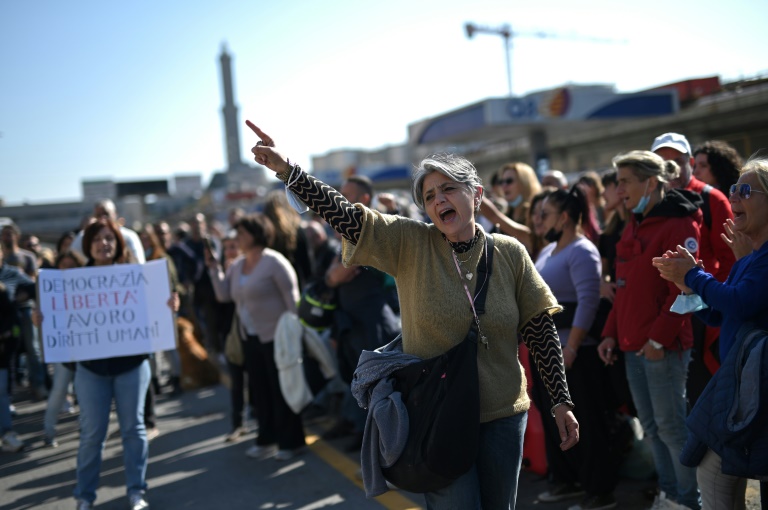Protesters massed at some of Italy’s major ports Friday as thousands took to the streets against the introduction of one of the world’s toughest Covid pass regimes.
More than 6,500 people demonstrated at the northeastern port of Trieste, according to local government estimates, although regional president Massimiliano Fedriga insisted that “the port is working”.
Delays were reported at the northwestern port of Genoa, where about 300 people blocked an entrance, while pockets of protests broke out across Italy ahead of bigger demonstrations called for later in the day.
The government is braced for widespread disruption by Italians angry at the extension of the coronavirus “Green Pass” to all workers, after a demonstration last weekend sparked violent clashes in Rome.
From Friday, all workers must show a Green Pass offering proof of vaccination, recent recovery from Covid-19 or a negative test — or face being declared absent without pay.
More than 85 percent of Italians over the age of 12 have received at least one jab, thus automatically qualifying for the pass.
Among those who have not been vaccinated, a minority say they either oppose the idea or are fearful. Some foreigners have also reported difficulties getting the jab, including undocumented workers.
But up to three million workers are estimated to be unvaccinated — and most will only be able to work if they pay for their own tests either every 48 or 72 hours, depending on the type.
Ivano Russo, director general of trade group Confetra, told AFP that out of a total of 900,000 truck drivers, couriers and warehouse staff employed by members of his lobby, “25 to 30 percent” do not have Covid certificates.
Dock workers in Trieste have threatened to go on strike indefinitely, despite being offered free Covid tests.
“Citizens not puppets” and “No Green Pass, No Discrimination” read some of the placards in the crowd gathered Friday.
In Genoa, the small blockade was peaceful early Friday, according to an AFP journalist, although some truck drivers reported delays.
“Today it’s really hard to unload,” Marco, a 50-year-old driver, told the ANSA news agency.
“I have to unload, I have to be able to work. I took the vaccine to get the Green Pass because I have to work.”
– Downloading passes –
Prime Minister Mario Draghi’s government says the pass will help prevent further lockdowns in Italy, one of the European countries hardest hit by the coronavirus pandemic.
Business lobby Confindustria has been among the staunchest backers of the measure, which follows a similar initiative adopted in Greece last month, saying it would “create workplaces that are as safe as possible”.
Introduced in August, initially for museums and indoor dining, it has also had the effect of boosting vaccinations, and rates of infection currently remain low.
The eurozone’s third largest economy is expected to record almost six percent growth this year after a devastating Covid-induced recession.
Ahead of the extension of the Green Pass to workplaces, more than 560,000 certificates were downloaded on Wednesday and around 860,000 Thursday, according to government data.
However, there are concerns there is not enough capacity for everyone who is not vaccinated to have regular Covid tests, raising the prospect of mass absenteeism from work.
Anyone caught in the workplace without a Green Pass risks fines ranging from 600 to 1,500 euros ($700 to 1700).
And those who fail to turn up for work because they don’t have one face suspension on no pay — but cannot be fired.
Meanwhile, employers can be fined 400 to 1,000 euros for not checking if their staff comply with the rules.
Trade unions initially called for compulsory vaccinations to avoid discrimination between those who were and were not jabbed.
They are now pushing for free tests, saying staff should not have to pay to go to work, although ministers so far seem unlikely to agree.










